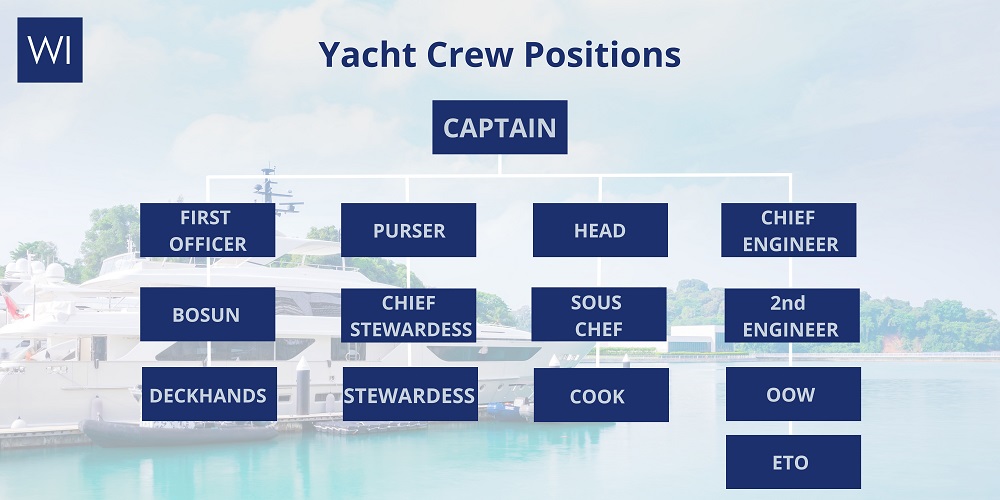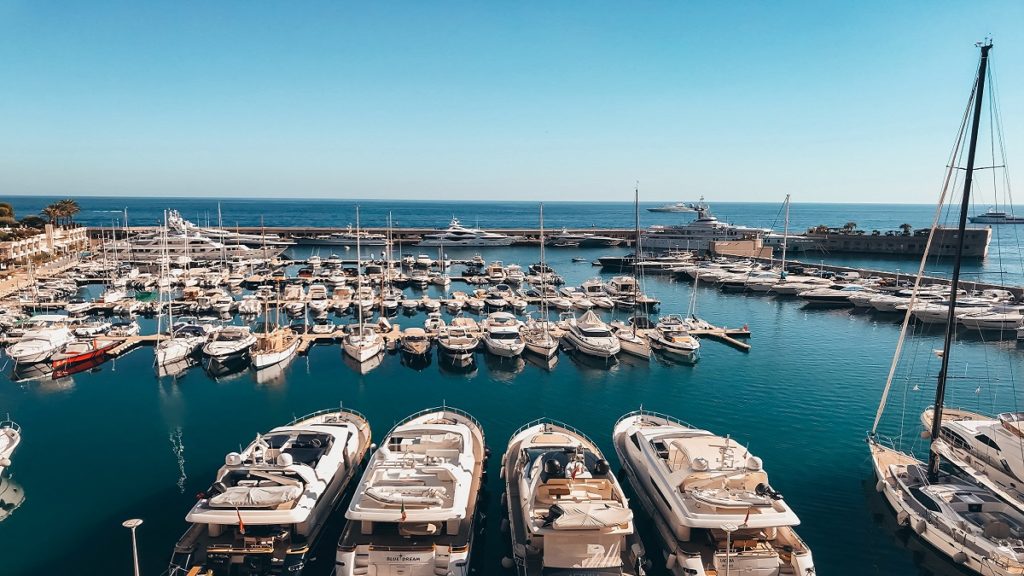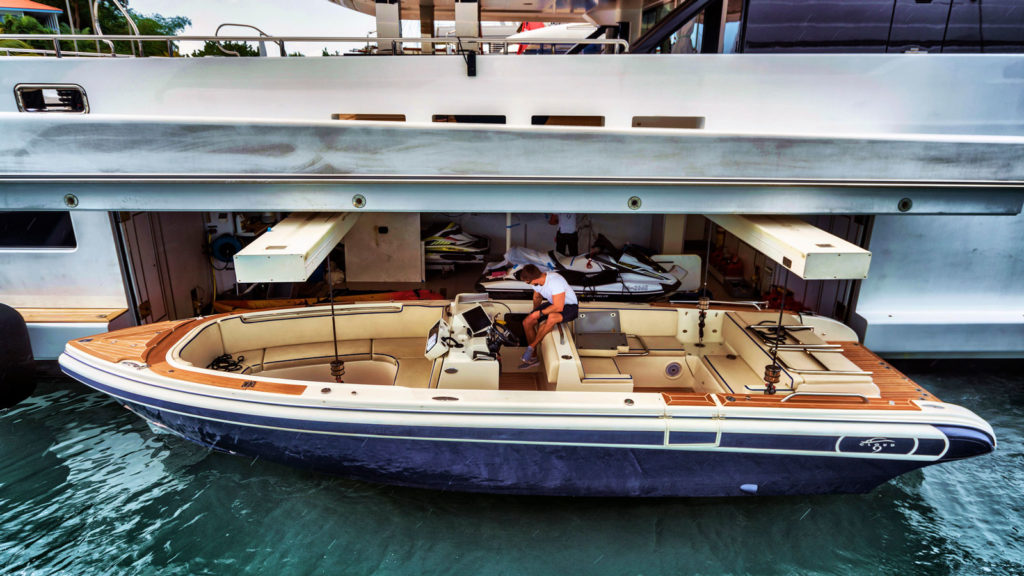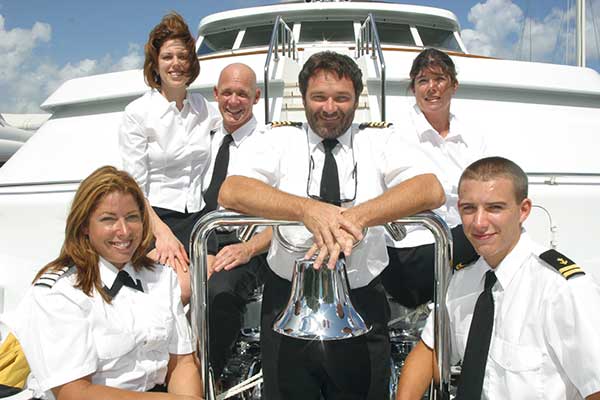

Yacht Crew Salaries: Complete Guide to What Yacht Crew Earn
It’s no secret that the impressive yacht crew salaries attract most people into the exclusive yachting world.
Junior deckhands or stewardesses can earn starting salaries of $3000 per month. With a few years of experience and some courses to back you up, this amount moves up towards $4000-$4500 per month!
In order to compile this superyacht crew salary guideline, I have taken 10 of the top yachting platforms and used all of their data, combined with my personal experience, to reach an average salary expectation for each position.
Table of Contents
How Much do you Make Working on a Yacht?

Yacht Captain Salary
- 20m-30m: $4000-$7500
- 30m-40m: $5500-$9500
- 40m-50m: $8000-$15000
- 50m-70m: $13000-$19000
- 70m+: $16500+
Requirements of a Yacht Captain
- Years of experience needed: 3-5 years of experience as Chief Officer/Mate and more than 5 years of experience as a Captain for larger yachts
- Minimum level of Qualification: 200ton licence which allows you to drive vessels below 200tons
The Captain has the highest level of responsibility onboard the yacht and hence they earn the most out of all the yacht crew salaries.
Captains are accountable for the overall safety of the yacht, crew members and guests.
They also handle daily operations of the yacht, guests, and owner liaison. They deal with management companies, port control, budgets, human resources, and many more tasks and logistics that make the job demanding and stressful.
On top of this, Captains are required to hold high levels of certifications depending on the size of the yacht they are driving.
Yacht Captain salaries can sky rocket with higher levels of qualifications.
If you are looking to become a Yacht Captain one day I recommend looking into the courses required so you can get started with licenses and sea time. It takes time to get there, but when you do it will be worth it.

Chief Officer Yacht Salary
- 30m-40m: $4000-$6000
- 40m-50m: $4500-$7500
- 50m-70m: $5500-$9000
- 70m+: $8000+
Requirements of a Chief Officer
- Years of experience needed: 3-5 Years
- Minimum level of qualification: Officer of the Watch
The Chief Officer is second in command to the Captain and is responsible for carrying out the Captain’s standing orders.
On smaller yachts, the Chief Officer is referred to as the Mate.
The Chief Officer is responsible for carrying out the safety duties onboard and assisting in the bridge with paperwork and navigational planning.
The Chief Officer is also responsible for leading and managing their deck team, ensuring crew are following their duties as well as managing the water sports and guest activities.
The salary of a Chief Officer depends heavily on the license held.

Bosun Yacht Salary
- Years of experience needed: 2-3 years
- Minimum level of qualification: Yacht Master Offshore
- A yacht Bosun salary can vary between $4000 and $6000.
Responsibilities of a Bosun
The Bosun is essentially the Lead Deckhand onboard. A lead deckhand salary on a larger vessel will be similar to that of a bosun salary on a smaller vessel.
This is an opportunity to step up from being a deckhand and gain some experience in a leadership role. This position is in place for larger yachts so that when the Officer is busy with bridge duties, someone is in charge on deck.

Yacht Deckhand Salary
Years of experience needed: 0
- Minimum level of qualification: None needed, however Power Boat Level 2 and Yacht Master offshore will put you at a great advantage
- Entry-level yacht crew salaries start at $3000 and can go as high as $4000/$4500.
Responsibilities of a Deckhand
A Deckhand is an entry-level role on a yacht.
You need to spend a few years (or less) as a Deckhand in order to learn and gain experience so that you can step up in the ranks and obtain your licenses.
This role will be very hands-on in maintaining the exterior of the yacht. Duties will include cleaning, polishing, varnishing, sanding, caulking, and any other maintenance work required.
Chief Steward / Chief Stewardess Salary
- 30m-40m :$4500-$5500
- 40m-50m :$5000-$7000
- 50m-70m- $5500-$8000
- 70m+: $7500+
Responsibilities of a Chief Stewardess/Steward
- Years of experience needed: 3-5 years
- Minimum level of qualification: Depending on the size of the vessel you may need courses such as Food Hygiene and Safety, Silver Service, WSET, or a Purser course
The Chief Stewardess or Steward is responsible for all the interior operations of the yacht .
They are responsible for managing the interior team, and ensuring the interior of the yacht is maintained to the highest standards. Besides cleaning and laundry schedules , this also includes provisioning for crew and guests, budgeting, accounting, and training of junior crew.

Steward or Stewardess Yacht Salary
- Minimum level of qualification: Depending on the size of the vessel you may need courses such as Food Hygiene and Safety and Silver Service
- Salaries start at $3000 and go up to $6000
Responsibilities of a Steward or Stewardess
A Stewardess/Steward is an entry-level position working within the interior of the yacht.
There are rankings within the interior (2nd, 3rd, 4th Steward/Stewardesses). As you spend more time in the industry, you will be promoted to higher ranks, and with that will come a better salary and more responsibility.
This role covers a range of tasks, including but not limited to housekeeping, laundry, bartending, table scaping, floral arrangements, serving, and hosting guests.

Engineer Yacht Salary
- 20m-30m: $4000-$5000
- 30m-40m: $4500-$6500
- 40m-50m: $6000-$8000
- 50m-70m: $7500-$11000
- 70m+: $9000+
Requirements of an Engineer
- Years of experience needed: 2-4 years in an engineering role onboard as Deck/Engineer or relevant land-based experience
- Minimum level of qualification: AEC
The Engineer onboard is responsible for all mechanical functioning and maintenance of the vessel. This is a very technical role that can pay well as you gain experience and obtain your licensing.
Yacht Chef Salary
- 20m-30m: $4000 – $5000
- 40m-50m: $5500 – $75000
- 50m-70m: $6500-$9500
Requirements of a Yacht Chef
- Years of experience needed: 3-5 years depending on previous experience
- Minimum level of qualification: Food Hygiene and Safety Level 2
The Chef is responsible for feeding the crew 2 to 3 healthy and sustainable meals a day. They are of course required to prepare meals for guests when onboard to the highest of standards.
In their day-to-day tasks, they will be responsible for their own provisioning of the galley, maintaining stocks, cleanliness, and hygiene of the galley.
The salary of the Yacht Chef varies depending on qualifications and experience.

Yacht Crew Salaries for Private vs Charter Yachts
There are two types of super yachts that require crew: Private and Charter yachts. The salaries for yacht crew differ slightly between the two.
Private Yacht
A private boat is owned by a single person or family who uses the yacht for their own purposes. They don’t charter it out and you can expect to have the same guests onboard for the duration of your contract.
The benefit of these programs is that you get to know your guests well so you may find it easier to manage their wants and needs.
You may also benefit from traveling to off-the-beaten-track locations as I have!
For yacht crew working on these private boats, you will usually not receive charter tips.
Charter Yacht
A charter boat is one that gets chartered out by guests. This operates as a business and also means you will have different guests for every trip.
If you work on a charter boat you can expect to receive charter tips at the end of each charter. These are usually 10%-20% of the charter fee!
Considering these tips can be anywhere from $2000-$5000 per week depending on the size of the yacht, charter boats offer great earning potential and can skyrocket your salary as a yachtie.

Hi, my name is Lisa, a Chief Stewardess in the yachting industry with 10 years of experience, as well as 8 years of hospitality experience prior to that. Being in the yachting industry has been a whirlwind of adventure, growth, challenges and some of the best experiences of my life, and I am excited to share my knowledge and experiences with all of you.
How to Write the Perfect Yacht CV [With Template]
A day in the life of a yacht stewardess.

- Career Advice
- Salary Guide
- Digital Dockwalk
2023/2024 Superyacht Crew Salary Guide

Whether you’re continuing a long-standing career, climbing the career ladder, or getting your feet wet for the first time, Dockwalk ’s Salary Guide provides the full picture when it comes to crew compensation.
Salary is generally one of the top motivators for those looking for jobs in yachting, but it remains a closely guarded secret. Each year, the Dockwalk Salary Survey goes out to thousands of crewmembers and crew agencies across the world, gathering real-time salary feedback with the aim of creating greater transparency and understanding across the industry.
The 2024 Salary Survey is now closed. Check out the results in the September 2024 issue.
The Results of the 2023 Salary Survey
Our annual salary survey provided some unprecedented insights to what captains and crew earned in 2023.
The yachting industry is slowly returning to normal in the wake of the pandemic. Yachts are back to work around the world and many new ones are in the pipeline thanks to the surge in popularity the "social distant" yachting lifestyle has enjoyed. But, while this return to normalcy has opened up new crew jobs this year, crew themselves have been returning to the workplace in large numbers and competition has been fierce.
Many of the crew agents reported that crew wages largely are flat this year compared to last. Salaries went up in 2021 and 2022 when crew were in short supply, but now more crew are available than previously. While crew are demanding higher pay this year, they’re not necessarily receiving it, but some agents have seen salaries continue to rise since Covid. There are many factors that can affect the salary crew can expect, including where a yacht is based and the season.
The tables below show the “agency range,” which gives the average lows and highs of all ranges provided by the agencies, the “poll range,” where results from individual working captains and crew are tallied to show the lowest and highest of all the responses, and the “poll average” calculated from all the responses. Note that our figures do not account for longevity and experience, crew benefit packages, tips, or similar extra remuneration.
Not all positions with corresponding boat sizes had enough poll responses to be considered significant; those categories are marked with an asterisk to indicate if fewer than five crew responded in that size range for that position. Several categories had no or only one response, which is also noted.
To view the full table:
Dockwalk Salary Survey 2023 in USD and Euros
- Yachting for beginners
- Owning a yacht
- Motor Yachts
- Sailing Yacht
- Indian Ocean
- Mediterranean
- Buying or Selling a Yacht
- Yachting Events
- FAQ – Luxury Yacht Charter
- FAQ – Buying a Yacht
- FAQ – Sell your Yacht
- How Much Does It Cost To Charter A Luxury Yacht?
- All our Blog Post & News

Yacht crew positions : Hierarchy, Missions & Salaries explained

Like any well-run hotel, restaurant, or other luxury service, a crewed yacht needs organized structure and good management. Whether you’re staffing your own luxury vessel or looking for an exciting career working and traveling the world, you need to know how this structure works, and what you can expect to pay or earn and do in the various roles on board.
Every yacht is a little different, and organization may reflect the style of the captain or the demands of the owner. But the same jobs need to be done on almost every boat. Organized with ranks, heads of each division report to the Captain. It’s not a military-style organization, but there are parallels with merchant marine grades and structures.
Smaller yachts need fewer crew, and staff may wear multiple hats that cross more traditional divisions and may combine some jobs with others. Large yachts have more distinct divisions or subdivisions, with more specialization to divide tasks and manage staffing. The core skills are the same, but finding staff with the right blends to do the jobs is key. Crew with broader skills are highly sought after.
As a yacht owner, you shouldn’t have to worry about day-to-day management decisions or organizing all this. That’s why you have a captain, and it’s better to leave staffing decisions entirely up to him or her. But it’s still important to know what it is people you’re hiring do, why they’re there, and how many you need. You don’t want too many crew, or to be short-handed. An understanding of what your yacht needs helps you talk to the captain to keep your yacht running how you want it.
For those looking to break into yacht crew work, consider your skills and strengths, and what jobs appeal to you. You’ll need training before you work, and you can direct your job path through the training you seek. Your goal is a suitable position on a well-run yacht, so make yourself the most attractive candidate possible.
Yacht Work Life

Working on a yacht is also living on the yacht. Crew must have a space to sleep, food, and all the basics that any employee needs. Large yachts have space reserved for crew, and owners looking for quality crew should provide good working and living conditions. Your crew takes care of you, and you should take care of them.
Depending on where a yacht operates or what flag she flies, a variety of labor laws or rules may be in effect. These requirements may be for work visas, contracts and written agreements, and compliance with merchant and ship crew treaties and laws. Be prepared to have work and non-disclosure agreements between yacht and crew, though a few yachts skip this.
Seasonal Jobs
Many yacht positions are seasonal. Year-round employment is more likely for senior crew like the captain and department heads, but not all yachts see year-round use. And some yachts may use different crew in different locales between seasonal moves.
Any job listing should give seasonal information, with geographic information, the length of the season, and the prospects for year-round positions and repeat employment.
Hours, Salaries, and Expectations
Yacht crew is a service job at its core, and every yacht owner is looking for service-oriented people who understand how to deliver a hotel-quality living and restaurant-quality fine dining. Work experience in luxury hotels and restaurants is a big plus for some jobs, and makes breaking into yacht work easier.
Yacht work can be very demanding, with periods of intense work when the owner and guests or a charter party is on board. Long days aren’t uncommon, but often balance with slack time when the boat is empty of passengers. There is always work to be done, but there’s usually a chance for time off.
Most salaries are monthly, since many positions are seasonal. Pay ranges are commensurate with experience, rank, and responsibility. Private vessels usually offer higher base pay, as charter crew can earn tips on top of their base salary. Because of the demands of the lifestyle, compensation is good and you have minimal living expenses on board.
Benefits and Time Off
Because so many jobs are seasonal and may occur in different countries and locations, benefits offered to yacht crew vary widely. But it is not uncommon for crew to be offered health and accident insurance and a flight to the vessel. Living on board, you’ll get food, rooming (usually shared), basic toiletries, uniforms, and laundry. Yachts with a longer view may offer additional training to long-term prospects.
Time off is usually linked to boat use, and may be sporadic in-season or when the boat has the owner and guests on board. There will always be some time off, but it may be between very intense work periods.
Most crew jobs have an employment contract that meets the Maritime Labour Convention 2006 (MLC). This should spell out the contract period and duration, as well as salary, leave and time off, probationary periods, repatriation policies, and any other crucial details to meet the minimum international standards of crew welfare.
This contract should also contain shipboard policies on confidentiality and non-disclosures, drug and alcohol use on board, personal hygiene expectations, interpersonal relationships, and dispute resolution. Job expectations and requirements can also be included, with specific language about roles, tasks, and cooperation between divisions.
Note that all crew agreements will explicitly prohibit drug use on board, most limit alcohol consumption and ban hard liquor on board, and many boats have policies prohibiting intimate personal crew relationships. Because the crew is living on board full time and in close quarters, rules to maintain decorum and crew harmony may be in writing.
Training & Certificates
Two key certifications are required for yacht crew. Employers look for the STCW (Standards of Training, Certification and Watch-keeping for Seafarers) and the ENG1 (Seafarer Medical Certificate). Insurers generally require crew to have these two certifications or the equivalent.
The ENG1 isn’t a class. It’s a medical exam to ensure that the crew is physically fit to serve at sea and has no underlying conditions that may arise far from help. It’s best for prospective crew to secure the ENG1 before investing more time and money training.
STCW is a week-long class on the basics of onboard safety. This includes hands-on modules covering personal survival, fire safety, first aid and CPR, accident prevention, and security awareness. It needs to be refreshed every five years.
Shared, Hybrid, and Crossover Jobs
Larger vessels will have more defined duties and specific areas of responsibility. But smaller yachts may want the crew to have different roles in different situations. For example, a hybrid job description may read “3rd Engineer/Steward” and describe a role in engineering when the boat is empty but on inside crew when passengers are on board.
When hiring or seeking jobs be prepared to look for creative crossover skill sets to meet the needs of the vessel.
Extra Skills and Duties
Any extra skills outside the regular duties makes crew more attractive. From stewards who can teach yoga, give massages or play cocktail piano to deck crew who know how to water ski, SCUBA dive, or fish, anything that crew can bring to enhance the passenger experience adds value to the employee.
If you’re looking for a position, list the skills you’d be comfortable using. If a vessel owner is looking for something specific, spell it out and figure out how that special duty fits into the employee work day.
The Four Main Divisions

Most yacht crews break into four primary divisions which group related tasks and responsibilities together. While the grouping sounds like it’s by section of the boat, they’re really more functional. For example, stewards (Interior) will definitely serve meals, whether they’re in the main dining room or out on deck. Deckhands (deck) are going to be involved in painting, sanding, and varnish jobs anywhere on the boat.
The deck crew handles most of the exterior operations of the yacht, and runs it. Deck hands and crew keep the boat looking clean and shiny, and handling most vessel operations. This includes driving and operating the yacht, navigation, running all launches and ship’s craft, handling lines, and all maintenance and painting, washing, and shining.
2-Interior (or Inside)
Inside crew are primarily the stewards and housekeepers. Larger vessels will have a dedicated housekeeping staff separate from the stewards, but smaller vessels may not.
Stewards keep the interior clean, do all housekeeping, laundry, food and beverage service, cabin preparation, and anything else needed for the comfort of the passengers.
3-Engineering
Below decks, the engineering department ensures the safe and smooth running of all the ship’s machinery and electronics. Engineers are engine and systems specialists, and there will usually be a dedicated electronics expert. Most engineer jobs require professional training and certification.
Fine dining is a hallmark of the yachting experience, and a full-time galley crew prepares all meals for passengers and crew. The head chef plans the menus and provisions the boat, while junior chefs assist the head chef with meal preparation and keeping the galley spotless.
Yacht Job and Department Details

Departments are all organized in a hierarchy, with a department head reporting to the Captain. The clear chain of command makes for smooth operations, with all communications going up and down ranks. Junior staff will occasionally take instructions from other divisions as all crew is expected to help as needed. A captain or department head may organize staff differently, so reporting structures listed are guidelines only.
All salary ranges are monthly figures and are ranges based on yacht size and crew experience. Senior jobs on larger yachts have more responsibility than the same job title on yachts with smaller crews. Experienced crew are very desirable and can expect more pay for their positions.
Listed responsibilities are not exhaustive, and different yachts may allocate some jobs to different positions.
Read also: The yacht charter experience ladder
The Captain

The captain of the vessel is the overall decision maker for the yacht in all situations, including the safety of the vessel. The owner should leave the Captain responsible for operational decisions about hiring and staff and operating the ship. To become a captain requires years of experience and training, and a broad set of skills including yacht operations, personnel management, budgeting and finance. The captain works directly with the owner and owner’s representative, if the captain is not also acting as the representative.
On an organization chart, the Captain is usually placed in the deck division, but the Captain is always the senior-most crew on the yacht and all division heads report to the Captain.
Responsibilities include:
- Responsible for all navigation and running the yacht.
- Senior decision maker on all crew hiring.
- Manage repairs, refits, and yard work.
- Manage budgets and accounting. On larger yachts, this task ends more on the Purser, but the captain is always responsible.
- Ensure all paperwork, clearances, and legal requirements are completed.
- Primary contact with the owner or charter parties.
Reports to: The yacht owner
Salary Range: $6,000 to $22,000
The deckhands handle all the outside responsibilities of the ship, including cleaning and maintenance of the yacht and all the ship’s vessels and toys on board. Deck crew will have significant contact with passengers in this role, operating launches and delivering guests to and from shore and handling the toys.
All deck crew have watch responsibilities on passage, and daily responsibilities keeping the yacht pristine and clean. They will also do line handling and secure the yacht.
Deck department : Chief Mate/First Officer
The Chief Mate or First Officer is the second in command of the vessel, and left in charge when the Captain is not on board. The first mate has the requisite skills to stand in for the captain and run the yacht if needed and usually acts as the division head of the deck team.
The seamanship skills needed are similar to the Captain’s position.
- Primary safety officer for the yacht and all passengers and crew.
- Supervise and manage all operations on deck.
- Bridge watches on passage.
- Passage planning and navigation.
There may be additional mates on larger vessels, these 2nd, 3rd, etc. mates have similar responsibilities on rotation. But the first mate is senior and always second in command.
Reports to: Captain
Salary Range: $4,000 to $9,500 (First mate)
Second and more junior mates may earn $2,000 to $4,000
Deck department : Bosun

The Bosun is the senior deckhand and manages the junior hands on board. This will usually be the most experienced hand on board.
- Organizing all operations on deck.
- Coordinating the use, storing and launching of the ship’s boats, toys, and equipment.
- Managing the passerelle, watching passenger safety.
- Contact point for guest service on boats, toys, and trips to shore.
Reports to: First mate
Salary Range: $3,000 to $5,000
Deck department : Deckhands

Deckhands are constantly busy with maintenance, cleaning, polishing, and assisting guests as needed. They will assist other departments as needed or given special duties.
- Daily cleaning of the yacht’s exterior.
- Painting, varnishing, polishing.
- Line handling.
- Launching and operating dinghies and tenders.
- Repairs and carpentry.
- Helping guests as needed – everything from handling baggage and gear to embarking and disembarking.
Reports to: Bosun
Salary range: $1,300 to $3,000
Though every position on a yacht is service-oriented, the interior or inside crew provides the primary customer service. They will interact the most with the passengers daily, and they’re directly responsible for the quality of their experience on board.
Interior department : the Purser

The purser is the chief financial officer of the yacht and handles all the financial operations on board. Accounting, purchasing, payroll and hiring, and all money matters end up with the Purser. This is a senior staff position, and may be the interior department head. Smaller yachts may eliminate the purser’s job and add it to the captain’s and other senior staff duties.
Responsibilities Include:
- Accounting and bookkeeping for all financial transactions.
- Human resources and payroll.
- Handling logistics for all departments related to purchasing.
- Managing contracts.
- Event coordination, including off yacht bookings and payments.
- Primary administration of the boat’s business paperwork.
- Inventory and supply management.
Salary Range: $4,000 to $8,000
Interior department : The Chief Steward/ess

The chief steward or stewardess has primary responsibility for all service roles inside. Food and drink service, cabin preparation, and anything to do with helping the passengers be more comfortable and enjoy their stay. The chief steward will be inside crew with several years of experience.
The chief steward manages the interior staff, setting and enforcing vessel service standards. The chief steward ensures the crew delivers a five-star hospitality experience.
Chief Steward Responsibilities:
- Scheduling and training junior crew for meal and drink service and cabin preparation.
- Primary contact with guests for meals and drinks.
- Sommelier and wine service.
- Coordinate with the galley for meals and presentation.
- Decorate the interior, from flower arrangement to table settings.
- Arrange onshore activities and outings.
Reports to: Captain or Purser, depending on the yacht
Salary Range: $4,000 to $8,500
Stewards/Stewardesses
The stewards and stewardesses are the primary guest service staff. They will work closely with guests and passengers, and have daily contact with them as they meet most of their needs while on board.
Steward Responsibilities:
- Food and drink service.
- Room preparation and turndown service.
- Cleaning, polishing, housekeeping, and inside maintenance.
- Cabin detailing.
- Laundry, pressing, and folding.
- Help with outings, trips, debarkations.
Reports to: Chief Steward
Salary Range: $1,500 to $4,500
Housekeeping

Larger yachts may have a dedicated housekeeping and laundry staff. This will be part of the inside crew, under either the purser or the head steward. There may be a senior housekeeper, if there are more than one housekeeping crew on board.
Responsibilities are the cleaning and laundry portions of the steward’s job, and a laundry steward may spend most of her time inside the ship’s laundry.
An experienced Head of Housekeeping may earn from $4,500 to $7,000, while a Laundry Steward typically earns from $2,500 to $3,500.
Read also: CAN OWNING A YACHT TO CHARTER (REALLY) BE PROFITABLE?
Food service requirements on any yacht are high. Whether it’s a privately owned vessel or a charter, the expectations are always for top tier food service, with a variety of meals planned for the requirements of every passenger. Chefs and cooks prepare all meals on board for passengers and crew, but sometimes other interior crew may help with prep work or cleanup.
Smaller yachts have smaller galley crews, but the largest vessels may have an executive chef and several sous chefs. All chef positions require formal culinary training and experience, but cook positions are often entry level. Promotion from cook to chef is unusual without additional training.
Galley department : the Head / Executive Chef

On larger yachts, an Executive Chef will run the entire galley with the help of sous chefs and cooks. With an Executive Chef, there’s an expectation that the food and menus will be on a level with Michelin star-rated restaurants.
The executive chef brings a thorough understanding of food preparation and presentation, and moves food preparation past creative up to artistic. Job responsibilities are similar to a chef, but the job demands and the required experience and education are much higher.
Salary range: $7,000 to $11,000

The chef has overall responsibility for all meals on the yacht, from provisioning in remote places to hygiene and good safety. If there’s only one chef, she’s the head of the galley crew. Finding the best provisions in far away locations and making the best of local food availability is a major part of the job.
- Planning a delicious and varied menu for passengers.
- Sourcing all food and arranging transport to the yacht.
- Maintaining and operating within the galley budget.
- Preparing passenger meals with professional presentation and style.
- Cleaning and maintaining galley and galley equipment.
- Deliver menus and meals on time, while running an organized and spotless galley.
Galley department : Sous Chef
The sous chefs assist the chef in all aspects of running the galley, and may have independent assignments to plan and guest and crew meals. While not primarily responsible for provisioning, the sous chef will help with food selection, menu preparation, and planning. A sous chef must have formal culinary training.
Reports to: Head chef
Salary Range: $3,500 – $6,000.

Galley department : The Cook
Cooks may be entry-level positions or experienced, but do not require formal gastronomy education. They will assist the chef and sous chefs, cooking meals and dishes for guests and crew, helping with provisioning, and keeping the galley neat.
- Assist with provisioning and buying high-quality food from local sources.
- Follow all food handling and safety guidelines.
- Assist the head chef as needed, taking direction and guidance.
- Prepare guest and crew meals as required.
- Staying on top of galley inventories and supplies.
Salary Range: $2,500 to $3,500
Engineering

The engineering department keeps the yacht and all its systems working. Whether it’s the engines, electronics, air conditioning, or the plumbing – it’s up to engineering to keep it running.
There is considerable overlap with commercial shipping in the engineering field, as many of the same skills apply. And there is a broader range of qualifications and grades based on the size and power of the vessel. Job ratings may be set by required experience based on tonnage of ship or power of engines, with corresponding levels of pay and responsibility.
Unlike commercial shipping, engineers may get involved in other aspects of running the yacht, like helping with docking and water sports with mechanical toys.
Engineering certifications, training, ratings, experience and licensing are critical to hiring competent engineers, and for engineering crew it’s an important facet of career advancement. This is important for Chief and 2nd Engineers, which are often broken out by MCA (U.K. Maritime and Coastguard Agency) rating or other international equivalent.
MCA ratings for engineers Commercial and Private Yachts over 24m are:
Y4: Less than 200 Gross Tons and less than 1,500 kW engine power Y3: Less than 500 GT and 3,000 kW Y2: Less than 3,000 GT and 3,000 kW Y1: Less than 3,000 GT and 9,000 kW
There is also an unlimited rating for merchant vessels larger than the Y1 category. For discussing salary and responsibilities, we will include all ratings in one position description, but pay scales with the size of the yacht and any required higher ratings.
Chief Engineer
The chief engineer manages all aspects of keeping the yacht and its systems running. The chief engineer manages all the engineering staff, and directs all maintenance, repairs, troubleshooting and upgrades. This is a management position, but requires extensive hands-on technical experience and knowledge. Chief engineers on large yachts hold an MCA Y1 or Y2, smaller boats will have a lower rated chief and a smaller staff. Check Jooble.org to find abroad marine engineer vacancies.
- Provisioning, shopping, and stocking.
- Preparing passenger and crew meals.
- Following instructions and cooking under the direction of others.
- Galley cleaning.
- Follow food safety and storage procedures.
- Food pre-preparation.
Salary Range: $6,000 to $15,000
2nd Engineer
The second engineer is also a highly skilled position requiring a rating or license and several years of experience. This senior level engineer also needs knowledge of how to troubleshoot and maintain all yacht systems.
- Maintain and manage all engineering operations.
- Hire, train and supervise all engineers.
- Project manage all upgrades and retrofits, including managing budgets, contracts, and suppliers.
- Coordinate maintenance schedule for the entire yacht around the usage and seasonal schedules.
- Maintain costs and accounting for engineering operations.
- Design and handle all safety operations.
- Set and maintain standards for operations and cleanliness in the engine room.
Reports to: Chief engineer
Salary Range: $5,500 – $10,000
OOW (Officer of the Watch) Engineer
The OOW is a junior engineering position, but still licensed. There are two categories of OOW – MEOL (Marine Engine Operator License) and the more junior AEC (Assistant Engine Course). The overall responsibilities are similar, working to support the senior engineers and handle independent assignments. The AEC rating is entry level for licensed crew, but has training and certification.
- Support the chief in all projects.
- Maintain a clean, safe engine room.
- Perform all maintenance, troubleshooting and repair tasks as needed.
- Support motorized water sports.
- Occasionally assist with other vessel operations, like line handling.
Reports to: Chief Engineer
Salary Range, MEOL: $4,500 to $6,000 Salary Range, AEC: $2,500 to $3,500
Electronics/Technology Officer (ETO)
The ETO takes responsibility for all audio-visual and information technology on board. Ensuring passengers have access to the internet, movies, television, and music is a primary responsibility. This position carries a fair amount of passenger interaction, and an ETO needs good troubleshooting skills to go with customer service skills.
- Ensure all audio/visual and entertainment systems are always available for passengers.
- Assist passengers with personal technology and ship systems as needed.
- Conduct regular maintenance and upgrades of the network, information, and A/V systems around passenger schedules.
- Assist other engineers as needed, especially with electronic systems.
- Contribute as needed with other departments for boat and passenger operations.
Salary Range: $4,000 to $9,000
Junior Engineer
This is a lower or entry level position for someone with engineering skills but without formal licensing or certification. The junior engineer will help with safety and cleanliness, and assist in any engineering tasks as needed. The ability to solve problems and fix things opens this spot for anyone capable and willing to do the job.
- Help with cleaning, maintenance, and safety functions.
- Help anywhere needed on the yacht.
- Assist senior engineers as needed, taking direction and following instructions exactly.
- Constantly develop skills.
Read also: IS BUYING A BOAT A BAD IDEA?
Whether you are a yacht owner or considering entering this dynamic industry with an established and reliable crew, it is essential to have an understanding of the yacht’s hierarchical structure, mission priorities, and salary expectations. By doing your research on the complexity of yachting before hiring your team, you can confidently select the right group of experienced and qualified professionals for your needs. Staying up-to-date on top industry trends and knowing the capabilities of each type of yacht crew position will enable you to make sound decisions that support a safe and cost-effective journey. With quality personnel at your helm, you can cruise unhindered in luxury and explore new destinations with peace of mind.
Fractional Yacht Ownership : Everything you Need to Know
What is the best country to register your yacht offshore, you might also like.

5 Price Levels for Yacht Charters: Which Experience Can You Afford?

Windward Yachts Launches WhatsApp Channel for Latest Updates

What differentiates a yacht from a superyacht or a mega yacht?

- Charter & Brokerage
- Yacht Design & New Builds
- Tenders & Toys
- Superyacht Events Calendar
- Career & Training
- Departments
- Superyacht Crew Finances
- Sustainability
- Shipyards and Marinas
- Health & Wellbeing
- Polar Region
- Our Services
- Meet the Team
How to Become A Yacht Engineer
.png)
Are you looking for a career as a yacht engineer?
Wilsonhalligan have compiled a breakdown of the qualifications and requirements needed to start out as a yacht engineer. As well as insight into the job day-to-day and how to effectively land your dream position.
What does a Yacht Engineer do?
It depends on the type, size and usage of the yacht. But, the Engineering department are responsible for the operation, maintenance and repair of all:
- electricals
- electronics
- as well as in some cases, structural systems and appendages found on board a modern yacht and superyacht.
Skills needed to be a successful Yacht Engineer:
The role requires a keen eye for planning and organisation. Planned maintenance (carrying out preventative and explorative maintenance before failures occur) is a very important aspect in modern marine engineering. Skills in project management, resource allocation and time management are very desirable, in addition to extensive and diverse technical ability. Many yachts employ software programmers to aid a methodical approach to planned and preventative maintenance, as well as to record failures and repairs as they occur. As well as keeping an accurate inventory of spares held on board. Being able to efficiently use such software programs efficiently would be highly advantageous. Examples of these asset management programs are AMOS and IDEA .
Challenges as an Engineer Onboard a Yacht:
Engineering on a superyacht has particular challenges. Some yachts (particularly charter yachts) can be very busy, meaning a very fast paced and demanding environment. High expectations from owners and guests in regards to service and entertainment also puts a keen onus on engineering departments. They are expected to keep all systems working to minimise or eliminate down time and negative impacts on the itinerary. Of course, when the yacht is at sea, many of these systems are safety critical. Break downs and failures offshore bring a whole new set of challenges and risks.
Which qualifications do I need to get in to Superyacht engineering?
There are really two main entry routes in to yacht and superyacht engineering. They follow two distinct certification pathways – entering from commercial shipping, or working through yacht-based certification routes.
Firstly, the Commercial Shipping Route of Training for Yacht Engineering:
The Commercial Shipping route most commonly begins with a sponsored cadetship with a shipping company. Who, are working in partnership with maritime training providers. Candidates must apply to one of a number of cadetship schemes. And, if accepted will undertake usually 3 years of study and work experience on the sponsoring companies’ vessels. Culminating very often in the Officer of the Watch (Engineering) or ‘EOOW’ ticket. And, usually either an HND or BSc Degree in Marine Engineering or similar.
Once the EOOW certificate is in hand, candidates can be considered suitably qualified. As well as experienced for junior engineering officer roles on large yachts. A common first yachting job for EOOW qualified candidates is 3 rd Engineer. The main advantage of a cadetship is that seatime is gained quickly and on vessels over 3000 GT. It also allows for a ticket which is ‘unlimited’ by tonnage as all yacht engineering certificates are. This opens the door to working on the world’s largest mega and superyachts.
Also, the sponsoring company pays for all courses and examinations which would be extremely expensive if self-sponsored. And, very often a small training bursary is paid on top (some as much as €11,000 / year). The biggest disadvantage is that candidates will have to commit to different types of vessels during the cadetship. These are likely to be chemical tankers or containerships. But most of the large luxury cruise ship companies also offer cadetships. Which, is in some ways closer to the yachting industry. One facilitator of maritime cadetships is the Warsash Maritime Academy – see here .
Secondly, the Yacht Certification Route of Training for Engineering:
This route is made up of 6 key certificates:
The Approved Engine Course (AEC). Often seen as the base-minimum for superyacht engineers who wish to work on yachts over 24m LOA. Usually a 4-day course covering the theory of compression-ignition (diesel) engines and includes a large amount of practical workshops. View the full syllabus for the Approved Engine Course (AEC) . One common provider of AEC courses is Bluewater Yachting in Antibes – see here .
The Marine Engine Operators Licence (MEOL). This is the first certificate in the yacht route that requires sea service, specific shore based learning and an oral exam. View further details on MSN 1859 here .
Y4 Engineer. The first of what is commonly referred to as the ‘Y Tickets’. Y4 allows engineers to work as Chief Engineer on yachts between 200 and 500GT. And, up to 1500Kw in propulsive power.
Y3 Engineer. Allows engineers to work as Chief Engineer on yachts up to 3000GT and up to 3000KW in propulsive power.
Y2 Engineer. Allows engineers to work as Chief Engineer on yachts up to 3000GT and up to 6000KW in propulsive power.
Y1 Engineer. Allows engineers to work as Chief Engineer on yachts up to 3000GT and up to 9000KW in propulsive power.
The Maritime and Coastguard Agency have simplified the Y ticket structure however, and page 19 of MIN 524 provides a simple conversion table from Y tickets to the new standard – Small Vessel (or SV) tickets.
Some course providers are now offering yachting cadetships – one example is this one provided by the UKSA in Cowes on the Isle of Wight .
How To Find a Job as a Superyacht Engineer
Once you have the relevant qualifications, then comes the time to start looking for your first position. Of course, word of mouth and personal connections made through training are a fantastic way to gain knowledge on current positions available however, also consider the following:
Dockwalking – travel to one of the main Superyacht hubs like Palma, Antibes or La Ciotat and walk the docks asking yachts if they need engineering crew. You should take a proper CV , references , and make sure you are well – presented. Be polite and prepare yourself for some face-to-face rejection . However, don ‘ t take things personally .
Use a reputable crew agent such as wilsonhalligan who are MLC 2006 compliant, vastly experienced and a well respected crew recruitment agency in the industry who does the dock walking for you!
We hope you find this helpful! And, we wish you luck on all your career endeavours.
Check out the latest yacht crew jobs available with wilsonhalligan. also, like their facebook page where they post featured yacht engineer jobs as well as the latest jobs available..
For the latest Superyacht Content career and training news, click here.
Wilsonhalligan
Related articles, the maritime training academy will see you at the monaco yacht show 2024, lithium-ion battery safety on superyachts & the urgent need for industry awareness, know your ship how helideck pop-up foam firefighting systems work, life after yachting: sarah diggle-whitlock from seas the day.

Popular Posts
- Tender Of The Week: Two Flagship Ski Boat Models. A Double Treat!
- Superyacht Sustainability: The Common Myths
- AcqueraPro Officially Launch Desktop Platform
- PIBS Exclusive Networking Event ‘SUNSET SOCIAL’ By Superyacht Content & Oceanform
- The Big CrewFO ‘Rolex Giveaway’: here’s how to enter.
Superyacht Content
Social media influencer and digital brand expert.
Superyacht Content brings you the latest in social news for the superyacht industry.
Keep up to date with us across our social channels, and don’t forget to hit that share button!
- Superyacht News
- Superyacht Jobs
- Superyacht Marketing
Join our Newsletter
- Your Name First Last
- Your Email *
Copyright © 2023 Superyacht Content | Website Design by Zonkey
Privacy | Credits | Get in Touch
Essential Guides
Ocean Mapping
New to Yachting
How to use the data presented here
The table has been drawn up with the information collated with figures from the past year within various yacht departments. Please note that they an indication only of starting salaries and the actual salary will vary depending on multiple factors.
Many elements need to be taken into consideration with regards to yacht crew salaries and not just the size of the yacht. The type of yacht (motor or sail), its usage (private, charter or both) and cruising schedule will influence the salary offered. Additionally, key elements of the candidate’s profile must also be reviewed, what is their previous experience, how long have they been in a particular role, have they recently acquired a new qualification, and do they have a specialised skill set that will influence the salary negotiation?
The highlighted section corresponds to yachts who offer a scheduled leave or rotational package.
Salaries here need to be modulated in accordance with the type of rotation offered, 5:1; 3:1 or 2:2 for example. There may be several different rotational schemes on a particular yacht, 5:1 for the junior crew, 3:1 for the intermediary position and full rotation for positions of responsibility.
The rotational salary is generally only a reduced monthly reduction (between 10 and 20%) and allows for a larger pool of candidates who are fully committed to the yacht, its programme and owner.
For many key roles, professional qualifications are the basis to establishing a guideline salary, notably in the Engineering and Officer’s Department.
Following the effects of the Covid-19 pandemic on the yachting industry in 2020, the past 2021 was considered the year of revival for yacht crew placement.
With regards to salaries, the market saw a return to stability and no major new trends were recorded. There is always increased pressure to offer a scheduled leave or rotational scheme that now starts with yachts in the 40 to 50 metre range.

HOW MUCH DOES YACHT CREW EARN
Yacht crew salary guide.
The yachting industry is more appealing than ever, but it comes with its own set of challenges. With so many candidates available, the task is to match the right talent with the right yacht efficiently.
In this evolving market, crew members are prioritising a balanced work-life dynamic. While salaries and leave packages in yachting are usually competitive, flexibility is now crucial for attracting top-notch crew. Offering more flexibility in leave allows for a broader selection of candidates who are dedicated to the yacht, its schedule and its owner.

Key trends in superyacht crew recruitment
Offering Competitive Compensation Packages
Salaries and leave packages remain a crucial factor in attracting skilled crew members. Highly qualified crew are seeking packages that accurately reflect their expertise, certifications and the value they bring to their roles onboard.
Preference for Work-Life Balance
The desire for a better work-life balance continues to be prevalent among superyacht crew. This includes preferences for rotational positions that allow for scheduled time off, as well as yachts with itineraries that offer a good mix of guest-on and guest-off periods. Employers are responding by adjusting leave schedules and offering more flexible contracts to attract and retain top talent.
Emphasis on Soft Skills
While technical prowess remains crucial, there's a growing recognition of the importance of soft skills. Attributes such as teamwork, communication, and adaptability are increasingly emphasised during the recruitment process, reflecting the collaborative nature of yacht crew work and the premium placed on guest experience.
Underscoring Sustainability and Environmental Awareness
With increasing awareness of environmental issues, conversations are developing around sustainable practices. This includes expertise in managing waste, reducing emissions and operating advanced environmental technology on board.
Deck Department
All the Captain and Officer salaries will depend on experience and maritime qualifications.
* On smaller yachts the First Officer is generally referred to as the Mate or First Mate. On yachts over 100m / 3000GT there are often two distinct roles for a First Officer and a Chief Officer.
** Specialised Deckhand positions will englobe a Deckhand Tender Driver, Kite Surfer, Carpenter, Diver etc.
Sole/Chief Engineer:
For 30m — 40m the salary is based on the candidates holding an AEC/Y4
For 40m — 50m the salary is based on the candidates holding a Y3 / SV Chief 3000kw
For 50m — 70m the salary is based on the candidates holding a Y2 / SV Chief 9000kw
For 70m — 80m the salary is based on the candidates holding a Y1 / SV Chief 9000kw
For 80m — 100m the salary is based on the candidates holding a Y1/Class I
For 100m+ the salary is based on the candidates holding a Class I
Second Engineer:
For 40m — 50m the salary is based on the candidates holding an AEC
For 50m — 70m the salary is based on the candidates holding a Y3 / SV Chief 3000kw and on rotation. If the role is permanent then an EOOW qualification is required and the salary would be 5 000—6 500€
For 70m — 80m the salary is based on the candidates holding a Y3 / SV Chief 3000kw
For 80m — 100m the salary is based on the candidates holding a Y2/Class II
For 100m+ the salary is based on the candidates holding a Class I/Class II
Third Engineer:
For 70m — 80m the salary is based on the candidates holding a AEC
For 80m — 100m the salary is based on the candidates holding an EOOW - equal rotation or 4:2 for example
For 100m+ the salary is based on the candidates holding an EOOW - equal rotation or 4:2 for example
For 80m — 100m the salary is based on the candidates holding a STCW III/4
For 100m+ the salary is based on the candidates holding a STCW III/4
Please note that the salaries below are an indication only of starting salaries and that the actual salary will vary depending on multiple factors; job specific skills, professional qualifications and experience.
YPI CREW now offers a bespoke service for our yacht clients to assist with salary reviews and comparative analysis. Contact [email protected] for any further information.
Download the full YPI CREW recruitment market report
Download the YPI CREW Recruitment Market Report for an in-depth analysis of current trends in superyacht crew recruitment. Gain valuable insights into the market dynamics and trends specific to each department, providing a comprehensive overview of the industry landscape.
Are you looking for yacht crew for your yacht?
Contact our recruiters who will strive to find the perfect fit to your existing crew by presenting suitable, available and interested candidates, who will be pre-interviewed and credentials checked.
You can get in touch with us today by clicking here .
Explore the latest in yachting

Olympic Grit and Resilience: What Yacht Crew Can Learn from Elite Athletes

YPI CREW Announces its 2024 Superyacht Recruitment Market Report

Mind the Gaps: How to Explain Employment Breaks on Your Yacht Crew CV

YPI CREW TEAM
Meet our recruitment team.

YACHT CREW GUIDES
Download free yachting cv templates, let’s get started. call us on +33 (0)4 92 90 46 10 or email us..

Engineering Department
Chef department.
* No yachting experience
** Rotational positions start at 6 000€ while non-rotational positions start at 7 000€ *** Combined Cook/Stew or Cook/Deck role **** Lower end refers to crew with no yachting experience
***** Rotational positions start at 4 500€ while non-rotational positions start at 5 000€
More and more yachts, from 30m+, are offering rotation at all levels in the galley in order to secure the best candidate on the market.
Interior Department
Specialist Positions
30m — 40m
40m — 50m
50m — 70m
70m — 80m
80m — 100m
Chief Officer
First Officer*
Second Officer
Third Officer
Specialised Deckhand**
Deckhand Junior
4 500—6 000
45–60 days
3 500—4 500
2 800—3 000
45 days
6 000—9 000
3 500—5 500
8 000—13 000
45–60 days or equal rotation
5 500—7 000
50–60 days
3 800—4 000
9 000—18 000
60-90 days or equal rotation
6 000—7 500
5 000—6 500
5 000—5 500
60–90 days
14 000—20 000
7 000—9 500
5 500—6 500
61-90 days or equal rotation
4 000—5 000
3:1 rotation
90 days or 3:1 rotation
15 000—23 000
8 500—11 000
62-90 days or equal rotation
Discretionary
Equal rotation
9 500 + discretionary
7 500—10 000
6 500—7 500
4 500—5 500
3:1 rotation or equal rotation
Salary (€)
Chief Engineer
1st Engineer
Second Engineer
Third Engineer
ETO & AV/IT
4 000—6 000
Non-rotational
5 000—8 000
Non-rotational or equal rotation
7 500—10 000+
6 500—7 000
Non rotation or rotation
6 000—7 000
11 000—15 000+
7 000 — 8 000
Non-rotation or rotation
3 200—4 000
7 000—8 000+
13 000—15 000+
8 500—10 000
8 000—10 000
Head Chef/Sole Chef
4 500*—5 500
5 000—6 000
2:2 rotation or non-rotational
6 000—8 500
4 000—5 000***
6 000**—9 000
4 000****—6 000
4 500*****—6 000
2:2 rotation
Head of Service
Head of Housekeeping
Experienced Stew 1–3 years experience
Junior Stew 0–1 years experience
3 500—4 000
2 800—3 300
4 000—5 500
3 000—4 500
3 000—4 500
4 500—6 000
3 800—4 250
6 500—8 000
90 days+ or equal rotation
5 500—8 000
60 days+, 90 days+ or equal rotation
4 250—5 500
60 days+ or 90 days+
7 000—8 000
equal rotation
90 days+ or equal rotation
4500—5 500
8 000—9 500
7 000—8 500
5 000—6 000
Spa Manager (with yachting experience)
Spa Therapist (with advanced level training)
Masseuse / Beautician (with basic training courses)
Personal Trainer
Laundry Master
3 300—4 500
4 000—4 500
4 000—5 000
90 days + or equal rotation
Are you ready to find your new ideal job on board a yacht?
Become a member of YPI CREW and connect with our recruiters so they can guide you through your job search.
Each of our recruiters is specialised in crew placement for a particular department and they will do their best to get you an interview on board a yacht. They will also advise you on how to best present your experience and skills and prepare for a yacht job interview.
Our Mission, Vision and Values
Mlc 2006 compliance, essential guides, yacht crew positions.
Interior Crew
Spa Manager
Spa Therapist
Personal Trainer & Yoga Instructor
Hairdresser
Mandatory Certificates
B1/b2 visa information, how to write a memorable cv, how to prepare for an interview, yachting seasons, yacht crew salary guide, is yachting the right choice for me, cv templates, ocean mapping, new to yachting.
+33 (0)4 92 90 46 10

Yacht Crew Agency / Candidates / Yacht Salaries Guide
Yacht Salaries Guide
Many of our candidates are asking us for advice on what their salary should be on a yacht.
We have prepared a table of approximate wages in the yachting industry. Even though these salaries may give you a reference point, we would like to inform you that all yachts are different, equally as their owners.
These salary rates are based on the current state of the employment market in yachting in 2024. Real wages always vary depending on the candidate’s experience, training, certificates and additional skills.

Different Salaries of Yacht Crew Jobs
People working on a yacht can earn extras.
Tips are another big financial reward for the team of the superyacht to be rewarded. Specially operating on a charter yacht gives crew a great chance to earn extra money, but how much is expected? It is up to it. Common tips vary from 5% to 20% of the charter cost, sharing about 10% and split by all crewmembers.
Living on a private yacht cannot provide all such advice, but it has its own crew benefits, including greater rest, longer vacations, rewards and also the prospect of the owner’s unexpected donations. Such proprietors are often considered to tip.
Different Position in a Yacht Crew, Different Salary
Without a doubt, each position has a different monthly income. So the higher position you will get the higher salary you will get. Here are an overview about some positions on a yacht.
The Captain must be skilled and trained in maritime affairs, outstanding navigational knowledge, exceptional administration, coordination, strategy and diplomacy. A Superyacht Captain will have outstanding nautical expertise, repairs, electronics, professional procedures and accounting, Finance and administrative records knowledge. A captain must have a cool, charismatic demeanor and must be exceptionally competent to work with men, staff and visitors. Average monthly salary : 60ft (18m) à 2,200€ – 3,700€
During the captain’s absence, the Chief Officer / First Mate will have the captain’s good management and interpersonal abilities and outstanding experience and procedures in ISM and ISPS. The CEO will be someone with a solid history in deck work from prior practice with Deckhand or Boson. Average monthly salary : 60ft < 75ft (23m) à 2,200€ – 3,000€
Under the command and control of the commander, the chief steward must perform his or her duties. The head chef may therefore train and prescribe some lower level stews under his command, as the sole responsible for the interior of the vessel and for offering a satisfactory hospitality service to fulfill the holidaymakers ‘needs. Excellent support, networking and management are a must, as is an innovative environment. Average monthly salary : 100ft (33m) – 140ft (43m) à 2,200€ – 3,000€ +
Morgan & Mallet Yacht Crew Agency helps all yachting professionals find the best job and create a career in yachting
By clicking “Accept All Cookies”, you agree to the storing of cookies on your device to enhance site navigation, analyze site usage, and assist in our marketing efforts.
Hire and Find Experienced Yacht Crew staff
This form is for employers who are looking to hire crew only.
You want to talk to a recruiter to help you personalise your recruitment. Choose a date from the list of available appointments and let us guide you.
Click one of our contacts below to chat on WhatsApp

Social Chat is free, download and try it now here!
Insert/edit link
Enter the destination URL
Or link to existing content

Working On A Yacht? 9 Things To Consider + Salary Examples
Working on a yacht gives you the ability to spend your days and nights at sea while exploring fun and far-off places.
For this reason, many people wonder how to get into the industry and what other things they need to know about working on a yacht.
In this post, we’ll talk about the top 8 things to consider before getting a job on a yacht.
We’ll also talk about how much yacht workers earn:
Table of Contents
Are You Qualified To Work On A Yacht?

According to BlueWaterYachting, there are about 15,000 yachts in the world that are large enough to require a professional yacht crew.
This might sound like a lot, but not when you compare it to the number of people that would like to work on a yacht.
To set yourself apart from these people, you’ll want to have experience in whatever position you’re looking to fill.
Wondering what types of jobs exist on a yacht?
6 popular jobs you might hope to get on a yacht:
There are also other yacht-specific jobs that might come up as well. For instance, I saw a yacht that had two professional massage therapists on board.
These people might not be needed on every yacht like a captain would be, but they were needed for this particular yacht.
In addition to general job specifics, you’ll also need to be trained to work on a boat.
Many different companies offer short courses that will teach you the basics of yachting as well as the basics of first aid and water rescues.
You Need People Skills
Another thought to consider is that you’ll need to have superior people skills when working on a yacht. Remember, you’ll be in close quarters with a small group of people day in and day out. If you’re angry at a coworker or customer, you won’t have the ability to go home to get away from them at the end of the day.
For this reason, it is important that you’re able to get along well with others.
Also, remember that a yacht crew is often very diverse. People on your crew might come from different countries where the cultures are quite different.
You’ll need to be able to learn these people’s social customs and you’ll need to be comfortable with the fact that they might still be learning about yours.
Getting to know new people and new cultures is very rewarding but it can be difficult at first. You’ll need to be willing to work much harder at it on a boat than you would at a typical 9 – 5.
What About Sea Sickness?
Are you prone to motion sickness? If so, working on a yacht might not be the best idea. Getting sick on a short cruise might not be a big deal. The cruise is over in a few hours and shortly after you arrive on land, the seasickness goes away.
However, if you’re sick on an ocean voyage, you might be sick for days or even weeks at a time.
Before signing on to work on a yacht, you might want to take an ocean voyage to see how your body will react. It would be sad to get signed on to a three-month job only to find that after a few weeks you’re just too sick to continue.
Is there anything that can be done to stop seasickness?
Luckily, many people have found that their tolerance goes up over time. However, some people never get used to the sea and they will always be sick while traveling on it.
These people might want to change industries or find a more stable boat that does not go out in rough waters. For example, a person that gets seasick on the ocean might be perfectly fine working on a party boat on a river.
How About Your Health?
Another thought to consider is the fact that being at sea limits your ability to get medical care and medicine. People with long-term diseases might want to think twice before working on a yacht.
Imagine you have to take daily medication to stay healthy. Now imagine that this medicine does not show up at your next port. Will the yacht owner stick around to get you your medicine?
What happens if you don’t get your medicine? Will the disease become irreversibly worse?
People with health issues may want to resolve these issues before they look into a career on a yacht.
Otherwise, they might want to work on a yacht that does not do long trips. If your yacht only does weekend trips, you could always store extra medication on the boat to ensure your safety.
Privacy Issues To Consider
Privacy can certainly be at a premium on a yacht. Crew quarters are almost always shared quarters and you may not even have your own bed.
I’ve seen some ships where two people on different shifts share the same bunk.
For some people, this isn’t a big deal, for others, it could be a nightmare.
Also, remember that you’ll always be in close contact with other people. If you’re an extrovert the yacht could seem like paradise. However, if you’re more introverted and need to have a significant amount of alone time to be happy, this might not be the job for you.
Getting any real time to yourself on a yacht can often be an impossibility.
In fact, even extroverts may want to bring a set of earplugs with them so that they can get some peace and quiet from time-to-time.
How About Your Friends and Family
Setting sail across the ocean on a yacht while getting paid to do so can be a dream for some people. In fact, it might be a dream of yours. But, have you thought about your family and friends.
When you’re off on a 12-month voyage, you won’t be able to see your friends and family.
Depending on your situation, you might have to miss people’s weddings, graduations, birthdays, and many other momentous occasions. You may also find that when you get back, some of your personal relationships just aren’t as close as they used to be.
In fact, some of your friends may even resent you for leaving.
On the other hand, it is easier than ever to stay in touch with friends and family member while staying out of reach. With emails, satellite phones, and video calls, you can continue to cultivate relationships from afar, you just might have to work harder at it.
Seasonality For Working On Yachts
Jobs on yachts are often seasonal and can often be unsteady.
Some larger charter yachts might have a crew throughout the entire year.
The company that owns these yachts will want the crew ready to set sail for any customers they might get. In this case, the crew may only have passengers a few months out of the year.
Other jobs on yachts might only last a season. In fact, the most in-demand yacht jobs are usually only three months. This can be great for students and teachers looking to fill their summer up with a fun and interesting job.
For others, this kind of work might not be steady enough.
Availability
A potential yacht worker might also want to consider their availability. Jobs are more likely to appear around June and end in September. If you’re not available during these months, you may find that jobs are harder to acquire.
You’ll also need to be very flexible when it comes to availability.
These jobs can come up quickly and they can be filled quickly as well.
When a yacht owner wants to set sail it can often be at a moment’s notice so you won’t have much time to think about whether or not you want to take the job.
Wait a few days to respond and the yacht may have set sail by the time you answer.
What’s The Salary For Yacht Captains + Crew Members?
The salary of a yacht worker will vary, mostly based on the job title and job responsibilities.
Here are some example salaries of jobs that you might do on a yacht:
- Yacht Captain Yacht captains often receive large salaries. This salary is typically based on the size of the yacht that they are working on. According to CNN, this job is a six-figure job that can often range from $100,000.00 to $250,000.00. The reason this job pays so well is that it can be a stressful job. Captains need to be available 24 hours a day. They also have to be skilled in both managing people and operating large ships.
- Yacht Engineer/Deckhand These crew members will often average around $48,000.00 a year or $4,000.00 a month.
- Steward/Stewardess This crew member will average between $30,000.00 and $45,000.00, depending on experience. More experienced stews will often manage the other stews so they’ll end up earning more money for doing so.
- Yacht Chef The yacht’s chef usually makes six figures as well. This is because the chef is expected to be an experienced chef that can make luxury meals while out at sea.
Here’s everything you need to know about exactly how much the yacht captain and crew make .
They actually also make quite a decent amount of money from tips given by the owner’s guests .
Final Thoughts
Working on a yacht can be a fun and lucrative experience.
Just know that there are some challenges and be prepared to meet them when the time comes.
Click to share...
How Do I Become A Yacht Engineer – Qualifications and Requirements
If you are looking for a career as a yacht engineer, we’ve compiled a breakdown of the qualifications and requirements needed to start out, insight into the job day-to-day and how to effectively land your dream position.
What Does a Yacht Engineer do?
Depending on type, size and usage of the yacht, the Engineering department (be that a Sole Engineer or a department of 6 or more Engineers) are responsible for the operation, maintenance and repair of all mechanical, electrical, electronic, hydraulic, pneumatic and in some cases, structural systems and appendages found on board a modern yacht and superyacht.
Skills Needed to be a Successful Yacht Engineer
The role requires a keen eye for planning and organisation, as planned maintenance (carrying out preventative and explorative maintenance before failures occur) is a very important aspect in modern marine engineering. Skills in project management, resource allocation and time management are very desirable in addition to extensive and diverse technical ability. Many yachts employ software programs to aid a methodical approach to planned and preventative maintenance and to record failures and repairs as they occur as well as keeping an accurate inventory of spares held on board. Being able to efficiently use such software programs efficiently would be highly advantageous. Examples of these asset management programs are AMOS and IDEA .
Challenges as an Engineer Onboard a Yacht
Engineering on a superyacht has particular challenges as some yachts (particularly charter yachts) can be very busy, meaning a very fast paced and demanding environment. High expectations from owners and guests in regards to service and entertainment also puts a keen onus on engineering departments to keep all systems working to minimise or eliminate down time and negative impacts on the itinerary. Of course, when the yacht is at sea, many of these systems are safety critical and break downs and failures offshore bring a whole new set of challenges and risks.
Which qualifications do I need to get in to superyacht engineering?
There are really two main entry routes in to yacht and superyacht engineering which follow two distinct certification pathways – entering from commercial shipping, or working through yacht-based certification routes.
Commercial Shipping Route of Training for Yacht Engineering
The Commercial Shipping route most commonly begins with a sponsored cadetship with a shipping company working in partnership with maritime training provider. Candidates must apply to one of a number of cadetship schemes and if accepted will undertake usually 3 years of study and work experience on the sponsoring companies’ vessels, culminating very often in the Officer of the Watch (Engineering) or ‘EOOW’ ticket and usually either an HND or BSc Degree in Marine Engineering or similar.
Once the EOOW certificate is in hand, candidates can be considered suitably qualified and experienced for junior engineering officer roles on large yachts. A common first yachting job for EOOW qualified candidates is 3 rd Engineer. The main advantage of a cadetship is that seatime is gained quickly and on vessels over 3000 GT, allows for a ticket which is ‘unlimited’ by tonnage as all yacht engineering certificates are. This opens the door to working on the world’s largest mega and superyachts.
Also, the sponsoring company pays for all courses and examinations which would be extremely expensive if self-sponsored, and very often a small training bursary is paid on top (some as much as €11,000 / year). The biggest disadvantage is that candidates who ultimately want to work on superyachts will have to commit to different types of vessel for the duration of the cadetship – these are likely to be chemical tankers or containerships, but most of the large luxury cruise ship companies also offer cadetships which is in some ways closer to the yachting industry. One facilitator of maritime cadetships is the Warsash Maritime Academy – see here .
Yacht Certification Route of Training for Engineering
This route is made up of 6 key certificates:
The Approved Engine Course (AEC) – often seen as the base-minimum for superyacht engineers who wish to work on yachts over 24m LOA. Usually a 4-day course covering the theory of compression-ignition (diesel) engines and includes a large amount of practical workshops. View the full syllabus for the Approved Engine Course (AEC) . One common provider of AEC courses is Bluewater Yachting in Antibes – see here .
The Marine Engine Operators Licence (MEOL) – This is the first certificate in the yacht route that requires sea service, specific shore based learning and an oral exam. View further details on MSN 1859 here .
Y4 Engineer – The first of what is commonly referred to as the ‘Y Tickets’ – Y4 allows engineers to work as Chief Engineer on yachts between 200 and 500GT and up to 1500Kw in propulsive power.
Y3 Engineer – Allows engineers to work as Chief Engineer on yachts up to 3000GT and up to 3000KW in propulsive power.
Y2 Engineer – Allows engineers to work as Chief Engineer on yachts up to 3000GT and up to 6000KW in propulsive power.
Y1 Engineer – Allows engineers to work as Chief Engineer on yachts up to 3000GT and up to 9000KW in propulsive power.
The Maritime and Coastguard Agency have simplified the Y ticket structure however, and page 19 of MIN 524 provides a simple conversion table from Y tickets to the new standard – Small Vessel (or SV) tickets.
Some course providers are now offering yachting cadetships – one example is this one provided by the UKSA in Cowes on the Isle of Wight .
How are Engineering Departments Structured on Yachts?
Engineering departments vary widely according to the type, size and usage of the yacht in question, but most large yachts will have some or all of the following roles on board:
Chief Engineer (or Sole Engineer on smaller yachts with only one engineer) The Chief Engineer is in overall command of all Engineering operations on board and is the senior advisor to the Captain on all matters related to the condition and serviceability of the yachts engines, propulsion, ancillaries and hotel systems. Although Captains always retain supreme responsibility for the safety of the vessel, all the best captains will work very closely with the Chief Engineer and take heed of any advice and requests they make – after all, they are highly trained, experienced and knowledgeable subject matter experts. Chief Engineers are responsible for ensuring that the Yacht is in all respects compliant with the relevant laws and regulations governing the serviceability of the yachts systems and equipment. They are pivotal in ensuring the yacht passes any relevant flag state, port state or P&I club surveys and inspections.
1 st Engineer Some of the very largest yachts afloat employ a 1 st Engineer similar to those employed on Cruise Ships. If a 1 st Engineer is employed, they will take operational (day-to-day) command of the engineering team, supervising engineering tasks and allocating work as appropriate. This allows the Chief Engineer to concentrate on the large amount of paperwork and business management necessary on board a very large yacht.
2 nd Engineer The more common understudy to the Chief Engineer, the 2 nd Engineer often has responsibility for Engine Room maintenance and will take on many of the more challenging maintenance and repair tasks as required. The 2 nd Engineer acts as a supervisor for more junior crew, and in some cases will be able to deputise for the Chief Engineer if required.
3 rd Engineer The 3 rd Engineer will have specific duties, which may include maintenance of the ship’s lifeboats, tenders, jet skis, toys and deck equipment like winches, davits and hatchways. Very often 3 rd s are responsible for interior maintenance. Again, areas of responsibility vary from yacht to yacht. 3 rd Engineers are often focused on gaining the requisite experience and ‘seatime’ to progress to 2 nd Engineer.
4 th Engineer The most junior engineering officer on board, the 4 th is very often new to Marine Engineering and is learning the trade. 4 th Engineers are often engaged in structured learning programs, or at least splitting their time between phases at sea learning on the job with phases ashore attending courses. Again, this can vary widely across the industry.
Motorman A junior, but important role found almost exclusively on large yachts in excess of around 100m, the motorman (not gender-specific!) is responsible for the operation and basic maintenance of the yachts main engines and engine room systems. They may assist in starting and stopping large engines and generators, operating switch panels under the supervision of an officer or senior engineer and reporting anything unusual. Engine room cleanliness and order will be an important part of the role.
Wiper / Oiler On the largest yachts, especially those operating medium speed diesels or older conventional ship propulsion technology, a wiper and oiler may be employed in addition to the above with a focused role keeping engines and machinery spaces clean, and keeping greased bearings fed or keeping open rockers oiled etc. An ability to access confined spaces is often useful, and a keen eye for cleanliness in bilges and bunded tanks etc is often a must.
How To Find a Job as a Superyacht Engineer
Once you have the relevant qualifications, then comes the time to start looking for your first position. Of course, word of mouth and personal connections made through training are a fantastic way to gain knowledge on current positions available however, also consider the following:
Dockwalking – travel to one of the main superyacht hubs like Palma, Antibes or La Ciotet and walk the docks asking yachts if they need engineering crew. Make sure you take a proper CV, written references and go well presented. Be polite and be prepared for a good deal of face-to-face rejection, however don’t take it personally.
Use a reputable crew agent such as wilsonhalligan who is MLC 2006 compliant, vastly experienced and a well respected crew recruitment agency in the industry who does the dock walking for you!
We’re here to help
Elan House, 5a Little Park Farm Road, Fareham, Hampshire PO15 5SJ
- Brokerage New Construction How to Buy How to Sell
- Yacht Fleet Yacht Catalog Charter Marketing Destination Guides
- Financial Services Payroll & Accounting Payroll Service Process Logistical Support Admin Services Crew Admin
- Job Descriptions Crew FAQ
- About Sitemap

- Yacht Department Directory
- Engineering Department
Chief Engineer Unlimited
About the chief engineer unlimited.
The chief engineer on board a luxury superyacht manages all aspects of engine room operations including safety, maintenance, repairs, inventory along with management of the engineering team on larger vessels. The successful candidate will possess excellent trouble shooting and expert technical engineering skills as well as thorough knowledge of the wide variety of engineering systems onboard. This individual also can effectively project plan for large repairs/refits in coordination with routine maintenance. Productive contractor negotiations and detailed financial/time management of all engineering projects are crucial.On large yachts this role requires ten plus years of vast engineering experience onboard yachts and a minimum of a MCA Y1 - Y2 level license based on vessel requirements. There will be several engineers reporting to the chief engineer so leadership, management and training are also integral to this position.On smaller to mid-sized yachts this may be a solo position which requires strong multi-tasking skills, good time management and organization. This person will typically have at least five years of experience in engineering roles and a MCA Y2 - Y4 level license.

Job Responsibilities
- Ultimate safety for engine room operations
- Maintain the yacht's entire engineering operations
- Ability to manage and supervise engine repairs and rehauls
- Manage and train other engineers and deck crew
- Engineering inventory
- Planned maintenance schedule for all major systems
Required Skills
- Expert technical / trouble shooting experience
- Advanced knowledge of all systems onboard; engines, generators, fuel polishing, water makers, electrical, refrigeration, air conditioning, computers, hydraulics, sanitation
- Excellent planning for preventative maintenance
- Ability to prioritize and organize
- Multitasking
- Ability to delegate and train
- Knowledge of contractors
Salary Modifiers
- Project management certificate / advanced management degree
- New build experience
- Commercial experience
- Specialized certification (i.e. MTU)
- Lack of full-time experience as chief engineer
Position Statistics
Career path, chief y1 (<3000gt < 9000kw), chief y2 (<3000gt < 3000kw), chief y3 (<500gt < 3000kw), chief y4 (<200gt < 1500kw), 2nd unlimited, 2nd (<3000gt <6000kw), 2nd (<3000gt <3000kw), 2nd (<500gt <3000kw), oow engineer (meol), oow engineer (aec), electronics engineer (eto), junior engineer (unlicensed).

Yachts for Sale
Selling a Yacht
Tenders & Toys
Recent Sales

NEVER SAY NEVER AGAIN

Yachts for Charter
Destinations
Experiences
Charter Management
Charter Deals
Yacht Marketing
How to Charter

Superyacht Management
Crew Structure
Crew Management

THE WELLESLEY
Superyacht Construction
New Yachts for Sale
Yacht Design
Yacht Shipyards
Custom Construction
Built on Trust

Heesen 55m Steel

Benetti Oasis
Yacht Shows
News & Blog

Yacht Engineer Jobs
A much-needed trained professional aboard any superyacht, a yacht engineer’s primary role is to oversee the safe and efficient running of a yacht. A mid-life position, a yacht the engineer will either work by themselves or can be in charge of an engineering department, depending on the size of the yacht. This department is tasked with maintaining both the mechanical and electrical operations of the yacht, from the main engines to the small onboard appliances. It is the responsibility of a chief yacht engineer to watch over the safety of other engineers in the engine room, as well as other workers within the department. Yacht engineers jobs are available on both privately owned yachts as well as charter yachts, which are rented out per day or week.
Yacht engineer jobs are extremely rewarding. Given you have completed the STCW Basic Safety training and have an ENG1, you can begin looking for a job as a yacht engineer today. Check out our entire yacht engineer job offerings for more information.
DUTIES AND RESPONSIBILITIES
A yacht engineer’s daily tasks include ensuring all equipment is maintained properly and is in safe working conditions at all times; overseeing the yacht’s communication equipment; and making sure all engineering work is done correctly. This includes keeping relevant documents and logs up to date such as the Engine room Log, managing the disposal of oil, Blige water and sludge from the yacht and carrying out watch duties. The exact day-to-day job description of a yacht engineer varies per yacht, type and size of the yacht.
YACHT ENGINEER SALARIES
Yacht engineer salaries vary, depending on the size and types of yacht. Data indicates that working on a charter yacht can see a yacht engineer earn more than on a private yacht, but the role of chief engineer earns more on a private yacht in turn. A chief yacht engineer salary on a 66m yacht starts around €5,000, but it can increase to up to €12,000 for a chief yacht engineer working on 101 plus meter yacht.

Chief Engineer 45m Yacht

Deckhand/Engineer

55m Motor Yacht looking for a 2nd Engineer

45m looking for a Chief engineer

A 52m private motor yacht is looking for a deck/engineer

2nd Engineer needed for a 63m yacht

YACHTS FOR SALE
YACHTS FOR CHARTER
CHARTER MANAGEMENT
+377 97 77 67 57
SEO by The Agency

Yachts for sale
Selling a yacht
Recent Sale
Charter Guide
Subscribe to our newsletter to receive our latest offers, news and the finest selection of superyachts.
Yacht Crew Salaries
Average starting salary guidelines.
The crew salaries reflected below have been derived from placement records and job orders for both power and sail, reflected as an average, received by Crewfinders within the past year and may change without notice.

Build a Career You'll Love
Yacht engineer salary in new jersey.
How much does a Yacht Engineer make in New Jersey? The salary range for a Yacht Engineer job is from $84,644 to $115,078 per year in New Jersey. Click on the filter to check out Yacht Engineer job salaries by hourly, weekly, biweekly, semimonthly, monthly, and yearly.
- Per semimonth
- View Average Salary for the United States
- Rochelle Park, NJ
- Rockaway, NJ
- Rocky Hill, NJ
- Roebling, NJ
- Roosevelt, NJ
- Roseland, NJ
- Roselle, NJ
- Roselle Park, NJ
- Rosemont, NJ
- Rosenhayn, NJ
- Runnemede, NJ
- Rutherford, NJ
- Saddle Brook, NJ
- Saddle River, NJ
- Sayreville, NJ
- Schooleys Mountain, NJ
- Scotch Plains, NJ
- Sea Girt, NJ
- Sea Isle City, NJ
- Seaside Heights, NJ
- Seaside Park, NJ
- Secaucus, NJ
- Sergeantsville, NJ
- Sewaren, NJ
- Short Hills, NJ
- Shrewsbury, NJ
- Sicklerville, NJ
- Skillman, NJ
- Somerdale, NJ
- Somers Point, NJ
- Somerset, NJ
- Somerville, NJ
- South Amboy, NJ
- South Bound Brook, NJ
- South Dennis, NJ
- South Hackensack, NJ
- South Orange, NJ
- South Plainfield, NJ
- South River, NJ
- South Seaville, NJ
- Spotswood, NJ
- Spring Lake, NJ
- Springfield, NJ
- Stanhope, NJ
- Stanton, NJ
- Stewartsville, NJ
- Stillwater, NJ
- Stirling, NJ
- Stockholm, NJ
- Stockton, NJ
- Stone Harbor, NJ
- Stratford, NJ
- Strathmere, NJ
- Succasunna, NJ
- Swartswood, NJ
- Swedesboro, NJ
- Teaneck, NJ
- Tenafly, NJ
- Tennent, NJ
- Teterboro, NJ
- Thorofare, NJ
- Three Bridges, NJ
- Titusville, NJ
- Toms River, NJ
- Township Of Washington, NJ
- Tranquility, NJ
- Trenton, NJ
- Tuckahoe, NJ
- Tuckerton, NJ
- Union City, NJ
- Vauxhall, NJ
- Ventnor City, NJ
- Vincentown, NJ
- Vineland, NJ
- Voorhees, NJ
- Waldwick, NJ
- Wallington, NJ
- Wallpack Center, NJ
- Wanaque, NJ
- Waretown, NJ
- Washington, NJ
- Watchung, NJ
- Waterford Works, NJ
- Weehawken, NJ
- Wenonah, NJ
- West Berlin, NJ
- West Creek, NJ
- West Deptford, NJ
- West Long Branch, NJ
- West Milford, NJ
- West New York, NJ
- West Orange, NJ
- Westfield, NJ
- Westville, NJ
- Westwood, NJ
- Wharton, NJ
- Whippany, NJ
- Whitehouse, NJ
- Whitehouse Station, NJ
- Whitesboro, NJ
- Wickatunk, NJ
- Wildwood, NJ
- Williamstown, NJ
- Willingboro, NJ
- Windsor, NJ
- Winslow, NJ
- Wood Ridge, NJ
- Woodbine, NJ
- Woodbridge, NJ
- Woodbury Heights, NJ
- Woodcliff Lake, NJ
- Woodstown, NJ
- Wrightstown, NJ
- Wyckoff, NJ
- Zarephath, NJ
- Elizabethport, NJ
- Absecon, NJ
- Adelphia, NJ
- Allamuchy, NJ
- Allendale, NJ
- Allenhurst, NJ
- Allentown, NJ
- Allenwood, NJ
- Alloway, NJ
- Andover, NJ
- Annandale, NJ
- Asbury Park, NJ
- Atlantic City, NJ
- Atlantic Highlands, NJ
- Audubon, NJ
- Augusta, NJ
- Avon By The Sea, NJ
- Baptistown, NJ
- Barnegat, NJ
- Barnegat Light, NJ
- Barrington, NJ
- Basking Ridge, NJ
- Bayonne, NJ
- Bayville, NJ
- Beach Haven, NJ
- Beachwood, NJ
- Bedminster, NJ
- Belford, NJ
- Belle Mead, NJ
- Belleville, NJ
- Bellmawr, NJ
- Belvidere, NJ
- Bergenfield, NJ
- Berkeley Heights, NJ
- Bernardsville, NJ
- Beverly, NJ
- Birmingham, NJ
- Blackwood, NJ
- Blairstown, NJ
- Blawenburg, NJ
- Bloomfield, NJ
- Bloomingdale, NJ
- Bloomsbury, NJ
- Boonton, NJ
- Bordentown, NJ
- Bound Brook, NJ
- Bradley Beach, NJ
- Branchville, NJ
- Bridgeport, NJ
- Bridgeton, NJ
- Bridgewater, NJ
- Brielle, NJ
- Brigantine, NJ
- Broadway, NJ
- Brookside, NJ
- Browns Mills, NJ
- Budd Lake, NJ
- Burlington, NJ
- Buttzville, NJ
- Caldwell, NJ
- Califon, NJ
- Cape May, NJ
- Cape May Court House, NJ
- Cape May Point, NJ
- Carlstadt, NJ
- Carteret, NJ
- Cedar Brook, NJ
- Cedar Grove, NJ
- Cedar Knolls, NJ
- Cedarville, NJ
- Changewater, NJ
- Chatham, NJ
- Chatsworth, NJ
- Cherry Hill, NJ
- Chester, NJ
- Chesterfield, NJ
- Clarksboro, NJ
- Clayton, NJ
- Clementon, NJ
- Cliffside Park, NJ
- Cliffwood, NJ
- Clifton, NJ
- Clinton, NJ
- Closter, NJ
- Collingswood, NJ
- Cologne, NJ
- Colonia, NJ
- Colts Neck, NJ
- Columbia, NJ
- Columbus, NJ
- Convent Station, NJ
- Cookstown, NJ
- Cranbury, NJ
- Cranford, NJ
- Cream Ridge, NJ
- Cresskill, NJ
- Deepwater, NJ
- Deerfield Street, NJ
- Delaware, NJ
- Delmont, NJ
- Demarest, NJ
- Dennisville, NJ
- Denville, NJ
- Dividing Creek, NJ
- Dorchester, NJ
- Dorothy, NJ
- Dunellen, NJ
- East Brunswick, NJ
- East Hanover, NJ
- East Orange, NJ
- East Rutherford, NJ
- Eatontown, NJ
- Edgewater, NJ
- Egg Harbor City, NJ
- Egg Harbor Township, NJ
- Elizabeth, NJ
- Elmwood Park, NJ
- Emerson, NJ
- Englewood, NJ
- Englewood Cliffs, NJ
- Englishtown, NJ
- Essex Fells, NJ
- Estell Manor, NJ
- Fair Haven, NJ
- Fair Lawn, NJ
- Fairfield, NJ
- Fairton, NJ
- Fairview, NJ
- Fanwood, NJ
- Far Hills, NJ
- Farmingdale, NJ
- Flagtown, NJ
- Flanders, NJ
- Flemington, NJ
- Florence, NJ
- Florham Park, NJ
- Forked River, NJ
- Fort Dix, NJ
- Fort Lee, NJ
- Fort Monmouth, NJ
- Fortescue, NJ
- Franklin, NJ
- Franklin Lakes, NJ
- Franklin Park, NJ
- Franklinville, NJ
- Freehold, NJ
- Frenchtown, NJ
- Garfield, NJ
- Garwood, NJ
- Gibbsboro, NJ
- Gibbstown, NJ
- Gillette, NJ
- Gladstone, NJ
- Glassboro, NJ
- Glasser, NJ
- Glen Gardner, NJ
- Glen Ridge, NJ
- Glen Rock, NJ
- Glendora, NJ
- Glenwood, NJ
- Gloucester City, NJ
- Great Meadows, NJ
- Green Creek, NJ
- Green Village, NJ
- Greendell, NJ
- Greenwich, NJ
- Grenloch, NJ
- Hackensack, NJ
- Hackettstown, NJ
- Haddon Heights, NJ
- Haddonfield, NJ
- Hainesport, NJ
- Haledon, NJ
- Hamburg, NJ
- Hammonton, NJ
- Hampton, NJ
- Hancocks Bridge, NJ
- Harrington Park, NJ
- Harrison, NJ
- Harrisonville, NJ
- Hasbrouck Heights, NJ
- Haskell, NJ
- Haworth, NJ
- Hawthorne, NJ
- Heislerville, NJ
- Helmetta, NJ
- Hibernia, NJ
- High Bridge, NJ
- Highland Lakes, NJ
- Highland Park, NJ
- Highlands, NJ
- Hightstown, NJ
- Hillsborough, NJ
- Hillsdale, NJ
- Hillside, NJ
- Ho Ho Kus, NJ
- Hoboken, NJ
- Holmdel, NJ
- Hopatcong, NJ
- Hopewell, NJ
- Imlaystown, NJ
- Irvington, NJ
- Island Heights, NJ
- Jackson, NJ
- Jersey City, NJ
- Jobstown, NJ
- Johnsonburg, NJ
- Juliustown, NJ
- Keansburg, NJ
- Keasbey, NJ
- Kendall Park, NJ
- Kenilworth, NJ
- Keyport, NJ
- Kingston, NJ
- Lafayette, NJ
- Lake Hiawatha, NJ
- Lake Hopatcong, NJ
- Lakehurst, NJ
- Lakewood, NJ
- Lambertville, NJ
- Landing, NJ
- Landisville, NJ
- Lanoka Harbor, NJ
- Lavallette, NJ
- Lawnside, NJ
- Lawrence Township, NJ
- Lebanon, NJ
- Ledgewood, NJ
- Leeds Point, NJ
- Leesburg, NJ
- Leonardo, NJ
- Liberty Corner, NJ
- Lincoln Park, NJ
- Lincroft, NJ
- Linwood, NJ
- Little Falls, NJ
- Little Ferry, NJ
- Little Silver, NJ
- Little York, NJ
- Livingston, NJ
- Long Branch, NJ
- Long Valley, NJ
- Longport, NJ
- Lumberton, NJ
- Lyndhurst, NJ
- Madison, NJ
- Magnolia, NJ
- Manahawkin, NJ
- Manasquan, NJ
- Manchester Township, NJ
- Mantoloking, NJ
- Manville, NJ
- Maple Shade, NJ
- Maplewood, NJ
- Margate City, NJ
- Marlboro, NJ
- Marlton, NJ
- Marmora, NJ
- Martinsville, NJ
- Matawan, NJ
- Mauricetown, NJ
- Mays Landing, NJ
- Maywood, NJ
- Mc Afee, NJ
- Medford, NJ
- Mendham, NJ
- Merchantville, NJ
- Metuchen, NJ
- Mickleton, NJ
- Middlesex, NJ
- Middletown, NJ
- Middleville, NJ
- Midland Park, NJ
- Milford, NJ
- Millburn, NJ
- Millington, NJ
- Millstone Township, NJ
- Milltown, NJ
- Millville, NJ
- Mine Hill, NJ
- Minotola, NJ
- Monmouth Beach, NJ
- Monmouth Junction, NJ
- Monroe Township, NJ
- Monroeville, NJ
- Montague, NJ
- Montclair, NJ
- Montvale, NJ
- Montville, NJ
- Moonachie, NJ
- Moorestown, NJ
- Morganville, NJ
- Morris Plains, NJ
- Morristown, NJ
- Mount Arlington, NJ
- Mount Ephraim, NJ
- Mount Freedom, NJ
- Mount Holly, NJ
- Mount Laurel, NJ
- Mount Royal, NJ
- Mount Tabor, NJ
- Mountain Lakes, NJ
- Mountainside, NJ
- Mullica Hill, NJ
- National Park, NJ
- Navesink, NJ
- Neptune, NJ
- Neshanic Station, NJ
- Netcong, NJ
- New Brunswick, NJ
- New Egypt, NJ
- New Gretna, NJ
- New Lisbon, NJ
- New Milford, NJ
- New Providence, NJ
- New Vernon, NJ
- Newfield, NJ
- Newfoundland, NJ
- Newport, NJ
- Newtonville, NJ
- Normandy Beach, NJ
- North Arlington, NJ
- North Bergen, NJ
- North Brunswick, NJ
- Northfield, NJ
- Northvale, NJ
- Norwood, NJ
- Oak Ridge, NJ
- Oakhurst, NJ
- Oakland, NJ
- Ocean City, NJ
- Ocean Gate, NJ
- Ocean Grove, NJ
- Ocean View, NJ
- Oceanport, NJ
- Oceanville, NJ
- Ogdensburg, NJ
- Old Bridge, NJ
- Oldwick, NJ
- Oradell, NJ
- Palisades Park, NJ
- Palmyra, NJ
- Paramus, NJ
- Park Ridge, NJ
- Parsippany, NJ
- Passaic, NJ
- Paterson, NJ
- Paulsboro, NJ
- Peapack, NJ
- Pedricktown, NJ
- Pemberton, NJ
- Pennington, NJ
- Penns Grove, NJ
- Pennsauken, NJ
- Pennsville, NJ
- Pequannock, NJ
- Perth Amboy, NJ
- Phillipsburg, NJ
- Picatinny Arsenal, NJ
- Pine Beach, NJ
- Pine Brook, NJ
- Piscataway, NJ
- Pittstown, NJ
- Plainfield, NJ
- Plainsboro, NJ
- Pleasantville, NJ
- Pluckemin, NJ
- Point Pleasant Beach, NJ
- Pompton Lakes, NJ
- Pompton Plains, NJ
- Port Elizabeth, NJ
- Port Monmouth, NJ
- Port Murray, NJ
- Port Norris, NJ
- Port Reading, NJ
- Port Republic, NJ
- Pottersville, NJ
- Princeton, NJ
- Princeton Junction, NJ
- Quakertown, NJ
- Quinton, NJ
- Rancocas, NJ
- Randolph, NJ
- Raritan, NJ
- Readington, NJ
- Red Bank, NJ
- Richland, NJ
- Richwood, NJ
- Ridgefield, NJ
- Ridgefield Park, NJ
- Ridgewood, NJ
- Ringoes, NJ
- Ringwood, NJ
- Rio Grande, NJ
- River Edge, NJ
- Riverdale, NJ
- Riverside, NJ
- Riverton, NJ
HOW SHOULD YOU USE THIS DATA?
Employees: Use this as a guide for salary expectations, but be aware that responsibilities can change across companies for the same job title, so there may be differences between this data, other free site and our subscription products bought by employers.
Employers: This data could be used as reference point in your market pricing, but not the only source, due to differences across jobs locations, and sizes of companies.Consider additional sources like our Employer reported data.
Our consulting team crafts efficient, data-driven solutions using the power of CompAnalyst ® , ensuring your challenges are met head-on.
The trusted data and intuitive software your organization needs to get pay right.
Let our management tool - JobArchitect™ streamline your job description process. Say goodbye to the hassle of crafting job descriptions.
What Should I Pay?
Highest Paying Cities for Yacht Engineer in New Jersey

States with Higher Salaries for Yacht Engineer
How much do similar professions get paid in new jersey, how much should you be earning, what does a yacht engineer do.
According to the Safety of Life at Sea (SOLAS) convention, it is the responsibility of the Yachts Chief Engineer to look after the safety of maritime professionals and other Engineers working in the engine room.
Holding an AEC certificate will allow you to be a chief engineer on a yacht over 24m and less than 200 Gross Tons or act as an assistant engineer on vessels over 200 GT up to 60NM from a safe haven.
The main role of a Yacht Engineer is mainly responsible for the safe and efficient running of the yacht.
These options may not offer you huge shortcuts when you start working towards becoming a yacht engineer, but they will provide you a knowledge base that is extremely beneficial as you advance.
On some yachts, there may also be a duel-deck engineer to help out with the deck and engineering jobs, and apprentices can even be hired in some instances.
View Job Skills and Competency Data for more than 15,000 Job Titles, 18 Industries, and 26 Job Families.
Most Common Benefits for Yacht Engineer
Related companies for yacht engineer in new jersey, frequently asked questions, how can i get fair pay as a yacht engineer, what're the daily responsibilities of a yacht engineer, how much does a yacht engineer make.
- Yacht Captain
- Yacht Manager
- Yacht Designer
- Yacht Broker
- Yacht Sales
Which city pays a higher Yacht Engineer salary in NJ?
What are the highest and lowest yacht engineer salaries in nj, career insights.


Yacht Crew Salaries By Position
Ever wondered what staff members aboard a luxury yacht charter make? Here’s a breakdown by position. Some may surprise you.
If you have ever binge-watched Below Deck, or daydreamed about working on a luxury yacht, you may have thought to yourself, “I wonder what they make?”. Many people across the world have jumped at the opportunity to rub elbows with the world’s elite while working aboard the most luxurious ships in the world.
If you have wondered what the salaries are for workers on a yacht, and want to take the next step toward a great mix of freedom and pay, joining a luxury yacht crew might be for you.
Crew jobs on yachts can be some of the most rewarding careers available, but they are also challenging. It is important to know what to expect when applying for a crew job. Here is a breakdown of what you can expect to find when applying for a yacht crew job.
Yacht Staff Departments
To understand the yacht crew job descriptions better, you have to understand the different departments in a yacht. These departments include:
- Deck – passage delivery, safety, outdoor guest activities, and exterior maintenance.
- Interior – guest wellbeing, housekeeping, accounting, activities.
- Engineering – smooth running of the yacht and safety.
- Galley – stock control, hygiene, food preparation, galley maintenance.
On any yacht, the captain is at the top of the hierarchy. They are responsible for reporting to the vessel’s owner via a representative or directly. Below are the job descriptions for yacht crew members in these departments.
Salaries will vary depending on the size, type, location, and use of the yacht. The crew’s experience and qualifications will also play a role in determining their salary.
Deck Department Roles
The captain’s job description includes: keeping the vessel safe and secure, ensuring that all crew members are doing their job, and reporting any safety concerns. Typically, this person will also be in charge of hiring other deck officers for specific duties. Depending on various factors, the captain could be paid $4,200 to $15,800 per month.
Although this an extremely high pay rate, it requires decades of experience typically. Being in charge of the safety of passengers, crew members and potentially a $50 million yacht is serious business!
Chief Officer/First Mate
Chief officers’ responsibilities include supervising the crew’s daily activities, maintaining duties and duties lists, and overseeing crew pay. This is also the person who will be in charge of hiring other crew members and managing the activities or watersports the guests would like to participate in. Typically, this person will make around $3,100 to $14,200 per month.
Second Mate
The second mate’s job description includes: being in charge of navigating the yacht and overseeing any repairs that may be needed. Typically, this person will make around $3,100 to $8,400 per month.
The third mate’s responsibilities include: handling deck chores and maintenance for the yacht. The salary is $2,600 to $6,300 monthly.
A bosun is in charge of safety and security, supervising diving operations and monitoring all deck equipment. They will also maintain the diving records whenever necessary. This person will make around $2,600 to $6,300 monthly.
Interior Department
A purser is responsible for hiring, training, and caring for all crew members. They are sent out to find candidates and supervise their performance in port and during sea trips. They are responsible for every operation in this department. Typical salaries go from $5,200 to $9,400 monthly.
Chief Steward
The chief steward is responsible for hiring, training, and supervising all crew members in the interior department. They will set up work schedules, determine pay scales and enforce penalties if they are not followed. Typical salaries go from $4,800 to $8,800 monthly.
The steward is in charge of the kitchen, taking orders and keeping track of all supplies. They unpack and pack the guest’s luggage and remain on standby at all times in case anything happens. Salaries go from $3,100 to $6,800 monthly.
Engineering Positions
Chief engineer.
He or she is in charge of the engine room and is responsible for ensuring it is operating smoothly. The chief engineer is responsible for providing services to all the other positions on board if needed. They will make around $6,300 to $15,600 monthly.
Second Engineer
As the second in command to the chief engineer, this person will be in charge of all engine room duties and services that need to be done. Salaries are typically around $3,200 to $10,500 per month.
ETO Officer
An ETO officer will oversee all electrical and electronic equipment, including everything from the GPS to the yacht’s peripheral devices, lighting, and communications equipment.
They will be in charge of setting up the systems, testing them during repairs, checking their functionality, and identifying any problems. Salaries are around $4,300 to $8,500 monthly.
Galley Positions
The head chef is in charge of all the food preparation and storage. All food preparation is under the direction of this chef. They are trained professionals who ensure that strict hygiene standards and food safety are maintained. Salaries go from $6,300 to $10,500 monthly.
The sous chef is in charge of food preparation and operations and preparing all menus at the direction of the head chef. They prepare, cook, and serve all food items that the guests require while on board. Salaries go from $3,700 to $8,400 monthly.
Galley Staff
There is a galley staff who works in the galley. Galley staff will be responsible for washing dishes, cooking, cleaning, serving food, and preparing daily menus. Salaries go from $2,500 to $4,300 monthly.
The Bottom Line
This article covers the yacht crew job descriptions for various jobs on the yacht and their salaries. As you plan to secure a job in the yacht crew industry, ensure you know everything you need to about the job. What will be the working hours? Will there be leaves to travel home? You must be prepared before applying for any of these jobs on a yacht charter .
One thing to note is that some ormost of these positions aren’t available on all yacht charters. This will depend on a number of factors including the numbere of guests, size of the yacht, budget of the guests and location of the yacht.
Being a member of a yacht crew is both flexible and very strict at the same time. Your level of service and professionalism are critical to ensuring the esteemed guests have an experience they expect for shelling out tens of thousands of dollars. So, expect very strict rules while on board.
To learn even more about renting a yacht in San Diego, please visit our articles page!

IMAGES
VIDEO
COMMENTS
The estimated total pay for a Yacht Engineer is $113,863 per year, with an average salary of $85,541 per year. These numbers represent the median, which is the midpoint of the ranges from our proprietary Total Pay Estimate model and based on salaries collected from our users. The estimated additional pay is $28,322 per year.
Learn how much yacht crew can earn in different positions and sizes of yachts, based on data from 10 yachting platforms and personal experience. Find out the requirements, responsibilities, and qualifications for each role, from captain to stewardess.
Find out the average salary for a Marine Engineer in the US, based on 151 salary profiles and updated in March 2024. Learn how to increase your pay, explore by city, skill, employer and more.
Find out the average salary range, highest paying cities, and related jobs for a Yacht Engineer in the US. Learn about the responsibilities, skills, and benefits of this profession and how to get a personal salary report.
Find out how much captains and crew earned in 2023 and what to expect in 2024 based on the Dockwalk Salary Survey. Compare salaries by position, boat size, location and season with the agency range, poll range and poll average.
Learn about the different roles and responsibilities of yacht crew, from captain to steward, and how to get hired or trained. Find out the work conditions, benefits, and expectations of working on a yacht.
The average salary for a Yacht Engineer is $85,137 per year in US. Click here to see the total pay, recent salaries shared and more!
Find out the average salaries for different crew positions on yachts of various sizes, from captain to deckhand. The document is based on real data from 350,000 crew records and provides job descriptions and requirements for each role.
How much does a Yacht Engineer make? As of Aug 5, 2024, the average annual pay for a Yacht Engineer in the United States is $95,796 a year. Just in case you need a simple salary calculator, that works out to be approximately $46.06 an hour. This is the equivalent of $1,842/week or $7,983/month.
How much does a Yacht Engineer make? Updated Feb 10, 2024. Experience ...
The engineering department aboard a yacht is essential to keeps things running. Working in this department requires a strong mechanical acumen, troubleshooting skills and the ability to maintain an immaculate engine room. Unlike in the commercial sector, engineers are often involved in docking procedures and guest water sport activities.
Learn about the qualifications and requirements for a career as a yacht engineer, and the challenges and skills needed for the role. Find out the difference between the commercial shipping and yacht certification routes, and how to land your first job on a superyacht.
Discover the ultimate yacht crew salary guide at YPI CREW. Get insights into competitive salaries for yacht crew members worldwide. Plan your career today!
Average monthly salary : 60ft (18m) à 2,200€ - 3,700€. During the captain's absence, the Chief Officer / First Mate will have the captain's good management and interpersonal abilities and outstanding experience and procedures in ISM and ISPS. The CEO will be someone with a solid history in deck work from prior practice with Deckhand ...
Yacht Captain. Yacht captains often receive large salaries. This salary is typically based on the size of the yacht that they are working on. According to CNN, this job is a six-figure job that can often range from $100,000.00 to $250,000.00. The reason this job pays so well is that it can be a stressful job.
Learn about the skills, challenges and certification routes for yacht engineering careers. Find out how to get a cadetship, an AEC, a Y ticket or a degree in marine engineering.
Yacht Chief Engineers Unlimited have 10+ years experience and are responsible for the Ultimate safety for engine room operations. They earn $144K-168K based on yacht size & experience.
Learn about the role, duties and responsibilities of a yacht engineer, who oversees the mechanical and electrical operations of a superyacht. Find out how to become a yacht engineer, what qualifications you need and how much you can earn on different types of yachts.
Specifically, the salaries were 7,000 to 8,000 euros ($7,600 to $8,700) vs. 3,500 to 4,000 euros ($3,800 to $4,400). Since on-deck positions range from captains to entry-level deckhands, yacht crew salaries here span a wide range. Notably, captains for 328-foot-plus (100-meter-plus) megayachts can get bonuses on top of an average 18,000 euros ...
Find average starting salaries for yacht crew positions, including 2nd Mate/Bosun, based on vessel size and itinerary. See salary guidelines for power and sail vessels, as well as freelance and professional yacht crew.
How much does a Yacht Engineer make in New Jersey? The salary range for a Yacht Engineer job is from $84,205 to $114,479 per year in New Jersey. Click on the filter to check out Yacht Engineer job salaries by hourly, weekly, biweekly, semimonthly, monthly, and yearly.
Depending on various factors, the captain could be paid $4,200 to $15,800 per month. Although this an extremely high pay rate, it requires decades of experience typically. Being in charge of the safety of passengers, crew members and potentially a $50 million yacht is serious business!
These professionals earn an average annual salary of $68,065 per year. Marine engineer: Marine engineers develop the internal components of a ship, such as its electrical, refrigeration, or steering systems. The national average salary for a marine engineer is $77,391 per year.